While attending mass on Father’s Day at our Catholic parish I noticed frenzied activity occurring in one of the pews near the front of the church. An elderly woman had passed out during the service and it wasn’t long before a crew of veteran EMT professionals arrived at the church to care for the poor woman.
The attending priest temporarily stopped the service and asked the community to pray in silence while the EMTs tended to her. I was struck while praying for the woman that she was stricken on the church’s feast day of Corpus Christi – a day where the Gospel reading for the mass includes these comforting words:
“I am the resurrection and the life. The person who believes in me, even though he dies, will live. Indeed, everyone who lives and believes in me will never die.” John 11:25-26
As they wheeled the gurney holding the unconscious woman away, I wondered to myself who would take her place in the pew next Sunday if she did not recover. It is something I increasingly ask myself as I witness the gradual decline in attendance at church and the disproportionately higher numbers of older worshipers attending mass relative to the number of young families.
A 2014 Pew Forum survey on church attendance confirms what I have been witnessing with my own eyes over the last 30 years.
- One-third (31%) of Americans report being raised in a Catholic household, but only about one in five (21%) Americans currently identify as Catholic (and only 15% of young adults aged 18-29)
- For every new Catholic convert, more than six Catholics leave the church (nearly 13 percent of all Americans now describe themselves as “former Catholics.”)
- The median age of Catholics attending mass has increased to 49 years old
- The fastest growing religious segment is the unaffiliated – those who do not claim to belong to any religion. They now comprise about 23 percent of the total population, and an even larger 39% of young adults
A small segment of the unaffiliated were labeled “rejectionists” by the survey; these are people who do not practice religion and who agree with the statement “religion is not personally important in my life and as a whole religion does more harm than good in society.”
A larger portion of the unaffiliated portray themselves instead as “seekers“; people who acknowledge the virtue of religion yet claim they are “spiritual but not religious“. The survey concluded that “The bulk of the unaffiliated are not carrying on faith traditions or seeking different types of spiritual activity. Most don’t give a lot of thought to religion and God in general”.
It is not surprising that many young people are not attracted to the Catholic religion given the patriarchal and hierarchical organization of the church, the publicity surrounding the clergy sexual abuse scandal and the negative religious treatment of gay and lesbian people.
To be honest, there have been periods of time in my own life when disillusionment with Church policies and the pressing concerns and desires that comprise daily living resulted in me drifting away from the church and becoming a non-practicing Catholic.
After these brief times away, however, I always found myself returning back to the church when I realized that the other things I was pursuing in my life did not bring me the spiritual satisfaction that my soul was seeking and that it received from belonging to a Church community. In my experience, religious faith benefits the soul as education benefits the mind.
Albert Schweitzer, the famed theologian, philosopher, physician and recipient of the Nobel Peace Prize once wrote; “If your soul has no Sunday, it becomes an orphan“. I understand the sentiment he was expressing because I did not feel right when I stopped practicing my Catholic faith. I felt like something was missing, like an orphan without a home.

With the general decline in Church attendance, how will future generations learn the moral lessons that the church instilled in me from an early age? Lessons like those below that have guided my steps and provided me with a strong foundation for my journey.
- God loves us and the purpose of our existence is to know, love, and serve Him
- All people have dignity and worth
- We are called to be compassionate to society’s poorest and most vulnerable
- God is merciful and forgiving – we should be too
- Look for the best in people and do not judge them
- Marriage is not just a legal agreement, it is a holy sacrament
- The virtues of humility, generosity, self-restraint, patience, kindness and diligence can overcome the sins of pride, greed, immorality, envy, over-indulgence, anger, and laziness
- Great value can come from adversity and suffering
- Death is not the end
These to me are the important lessons that I learned from being raised in the Catholic faith tradition and it is the people who live according to these teachings that are the true treasures of the Catholic church.
There are other ways to learn these life lessons outside of the church. I know this is true because some of the finest people I know did not grow up in a religious household and do not belong to a religious community – yet they are still a beacon of light and goodness.
I do not know how these remarkable people came to be the way they are, but it makes me hopeful to think that basic moral values are an integral part of the human spirit and that our hearts will be restless until we seek them out and find a way to give them a home either inside or outside an established religious community.
So, regardless of whether you are religious, non-religious, spiritual, or skeptic; my prayer for all of you is that you find what your soul is seeking – a good home.

Leave a comment